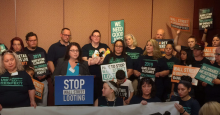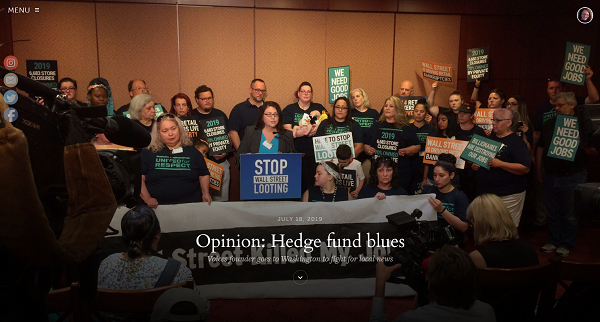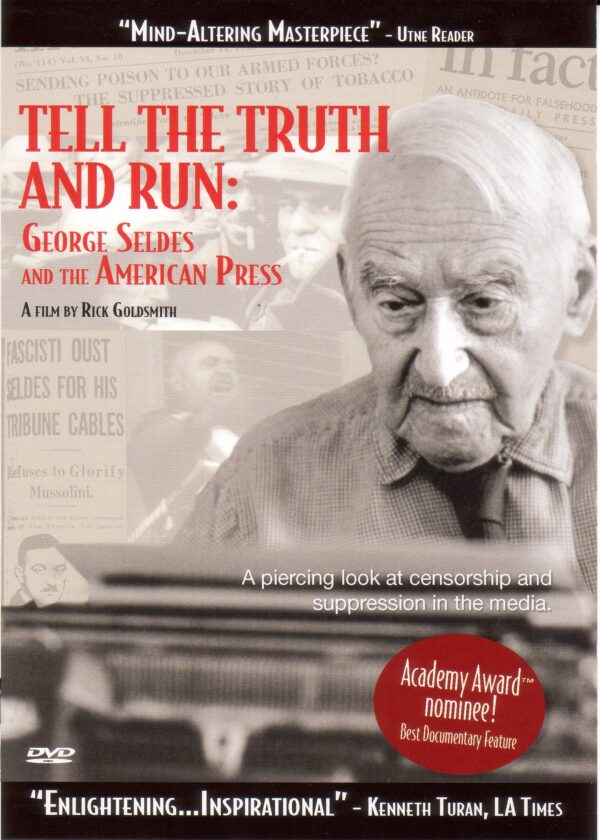
The hedge fund Alden Global Capital is notorious for plundering newspapers, relentlessly creating “news deserts” and “ghost papers.” The news is disturbing to anyone who cares about journalism. Indeed, most journalists agree that Alden, the nation’s second-largest newspaper owner by circulation, is a major threat to the existence of good, strong and enduring local journalism in America.
I’ve been covering this hedge fund for four years, for a film-in-progress, Stripped for Parts: American Journalism at the Crossroads. This film is a cautionary tale: What is lost when billionaires with no background nor interest in a civic mission, who are only concerned with profiteering, take over our most influential news organizations?
But the story we will tell is not only about the havoc wreaked by Alden daily, but about the journalists who have opposed them, and continue to do so. At the center is one reporter whose investigation, in more than 100 articles over six years, exposed Alden’s profiteering methods. It features several other journalists who became active, and activists—speaking out, informing the public or otherwise opposing their employer, often at great risk to their careers; some even created new, alternative news organizations.
Individually and together (with the support of the NewsGuild union), they are fighting for the preservation, and re-imagining, of vibrant local journalism in America. It is that notion that I want to highlight, above and beyond the devastation caused by the hedge fund.
‘Distressed investing’
I’ve been a news junkie all my life. My first feature film, begun in the late 1980s, was on the life and legacy of George Seldes—muckraker, press critic, maverick journalist. A later film, on Daniel Ellsberg and the Pentagon Papers, documented the decision-making inside the New York Times that led to its publication, in the face of attempted government censorship, of a “top secret” government document. It was one of the mainstream press’s finest hours. So mine has been a love/hate relationship with the news media: adoring but critical.
I got into my current film in the spring of 2018, on the heels of an uprising at the Denver Post against the paper’s owner that went viral. But the story starts even earlier, when almost no one had ever heard of Alden Global Capital.
At the center of it all is Julie Reynolds, who, after covering gang members, drug lords and gun runners for two investigative organizations, came to the small-town Monterey County (Calif.) Herald, “where I became the night cops reporter—and I loved it!” Until Alden Global Capital bought the newspaper in 2011. Layoffs followed, morale plunged, and Reynolds took a buyout.
But in 2015, she began investigating the hedge fund, with the backing of her former union, the NewsGuild. “You’re an investigative reporter,” she told herself. “Why don’t you look into Alden, because people don’t know who they are or what they do.”
Reynolds found a hedge fund shrouded in secrecy. From her home office, and using her investigative toolbox, she exposed Alden’s shell companies in the Cayman Islands. She explained the intricacies of “distressed investing”—how to make money off of failing businesses, by “stripping them for parts” and slashing payroll. She discovered a real estate scam that allowed Alden to make millions and siphon off the profits for private use.
Cascading events

A slider that accompanied the Denver Post‘s editorial (4/6/18) illustrated the dramatic reduction in the paper’s staff.
Reynolds’ reporting triggered a series of cascading events. Her exposés reached the newsroom of the Denver Post, including editorial writer Chuck Plunkett. In April 2018, after another large layoff of 30 (out of 100) from the newsroom staff, Plunkett had had enough. Using Reynolds’ investigations as raw material, he wrote a blistering editorial (4/6/18), excoriating the “vulture capitalists” that owned the Denver Post. He demanded, “If Alden isn’t willing to do good journalism here, it should sell the Post to owners who will.”
Plunkett’s editorial, in turn, sparked an uprising of journalists at the Post and elsewhere throughout the Alden chain. Usually reporting the news, now they were making it. Supported by the NewsGuild, they uncharacteristically joined picket lines at their local papers and in front of Alden’s headquarters in midtown New York’s Lipstick Building.
More cascading events: Alden’s top brass issued an edict not to mention Alden Global in the pages of their newspapers. Dave Krieger of the Boulder Daily Camera defied the edict and wrote about Plunkett’s editorial and the national wildfire it sparked. Krieger was instantly fired, Plunkett resigned due to censorship, and senior Post editor Larry Ryckman led eight reporters and editors out the door of the Denver Post, forming their own democratically run, ad-free, online news organization, the Colorado Sun.
Certain of the upper hand

The New York Times (1/14/19) quoted Nieman Journalism Lab’s Joshua Benton: Alden‘s “Digital First is the worst owner of newspapers in America and they will do their best to draw blood from even Gannett’s already desiccated stone.”
For all the pushback, Alden remained undaunted. Its principals, Randall Smith and Heath Freeman, refused interviews, or any requests for comment, even by reporters from their own newspapers. They held themselves accountable to no one and were certain they held the upper hand. They were wrong.
Alden made a takeover attempt for the entire Gannett newspaper chain in early 2019. If successful, the new entity would have become the largest chain of newspapers in America. The stakes were huge.
The Gannett board knew its shareholders would be attracted by the lucrative stock offer by Alden. But the work of Julie Reynolds and the NewsGuild would turn the tide. A Gannett board member explained:
Julie Reynolds’ stories were devastating in their clarity about the motivations of the principals at Alden… [and] it was the NewsGuild rather than the corporation [Gannett] that stood for the careers, the professionalism, the sense of mission that these individual journalists brought to work every day. And so their speaking about the importance of journalism and their sense that this particular buyer was not a friend of journalism was at least as credible as any message that our board of directors could deliver.
The shareholders voted against Alden, and its takeover attempt of Gannett failed.
Tribune takeover
But the hedge fund re-grouped. In 2020, Alden went after the Tribune Company, owner of the Chicago Tribune, New York Daily News and Baltimore Sun, among others. Public opposition was fierce, led again by the journalists and the NewsGuild.
But Alden had other tricks up their sleeve. As an already-large stockholder, the hedge fund was able to put its founder, Randall Smith, on the Tribune board, where he helped write and manipulate the rules of a shareholder election. Despite public outcry about the hedge fund’s reputation as “destroyer of newspapers,” Alden won the shareholder vote, but under a cloud of election irregularities, including, as Julie Reynolds wrote in a detailed investigative article, confusion about the voting intentions of Patrick Soon-Shiong, the billionaire surgeon and LA Times owner who held 24% of Tribune shares, and whose vote, even in abstention, was the key to the Alden victory.

Julie Reynolds Martinez (Voices of Monterey Bay, 7/18/19): “Alden Global Capital…is intentionally destroying the Monterey Herald, the Santa Cruz Sentinel, the Mercury News and scores of other news sources around the country.”
The Tribune takeover made Alden the second-largest newspaper publisher in the country, and it appears to be determined to become the largest. In late 2021, Alden attempted the takeover of Lee Enterprises, owner of daily newspapers in 77 markets in 26 states. Again journalists and the NewsGuild took action, and the Lee Enterprises board, like the Gannett board before them, rode a wave of public outcry and key legal decisions to beat back, at least for now, the hedge fund’s designs, as Reynolds reported. The Alden/Lee battle is apparently not finished, and journalists and their union continue to stand at the ready.
Julie Reynolds went to Washington a couple of years ago, joining Sen. Elizabeth Warren and others, to push pending congressional legislation that would regulate hedge funds more strongly. Reynolds said at an event introducing the bill:
It is catastrophic when hedge funds systematically and intentionally destroy the sources of information that are so essential to society. It’s time to make hedge funds and private equity transparent and accountable.
History will not judge us kindly if one day we wake up to realize we failed to protect our community’s right to know and, in turn, our very democracy.
Lifeblood of democracy
My task in the months ahead is to finish constructing a narrative that is truthful, reflective of the realities of hedge fund ownership and the crisis in local journalism, but still projects the drive and dedication of the journalists who are in the forefront of change.
Journalism is all-important, especially today. It connects and unites communities. At its best it comforts the afflicted, afflicts the comfortable and tells truth to power. When robust, it is the lifeblood of democracy.
Journalists are our everyday heroes: exposing secrets, uncovering abuses and giving us better understanding of our communities, our cultures, our politics, our world. Vigorous journalism is essential to our lives. Let’s help save it.
Visit strippedforpartsfilm.com to learn how you can support Rick Goldsmith’s current film-in-progress, Stripped for Parts: American Journalism at the Crossroads.

